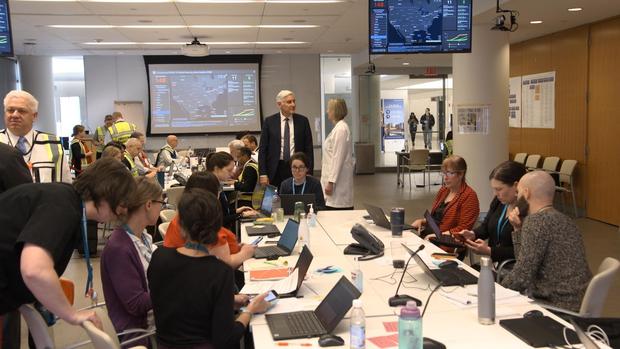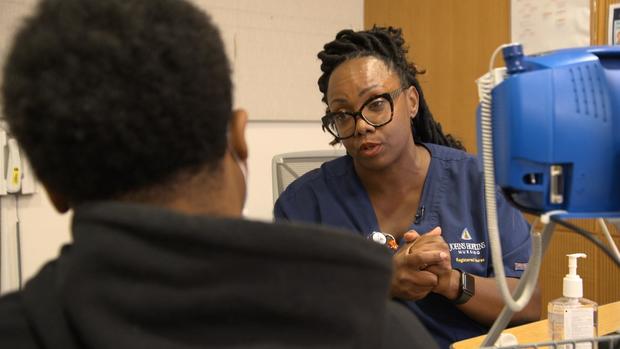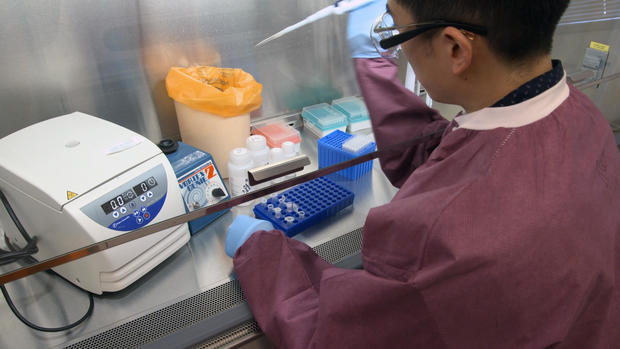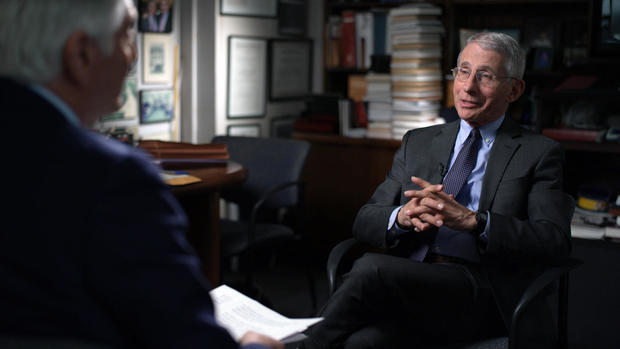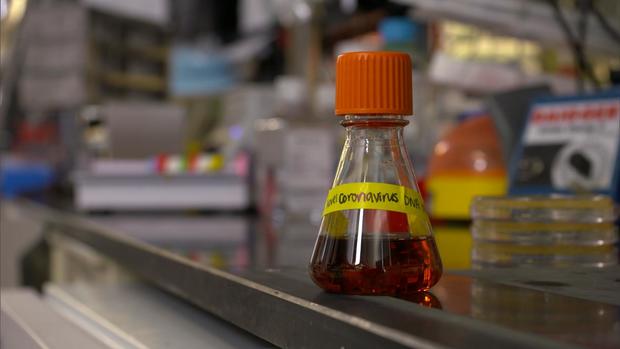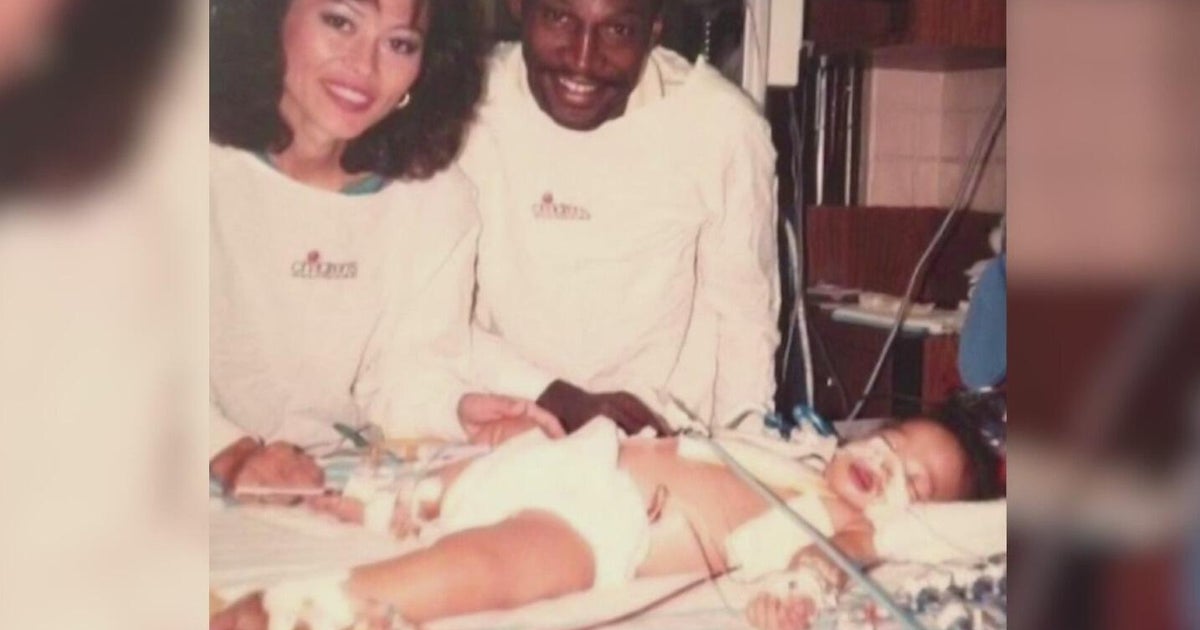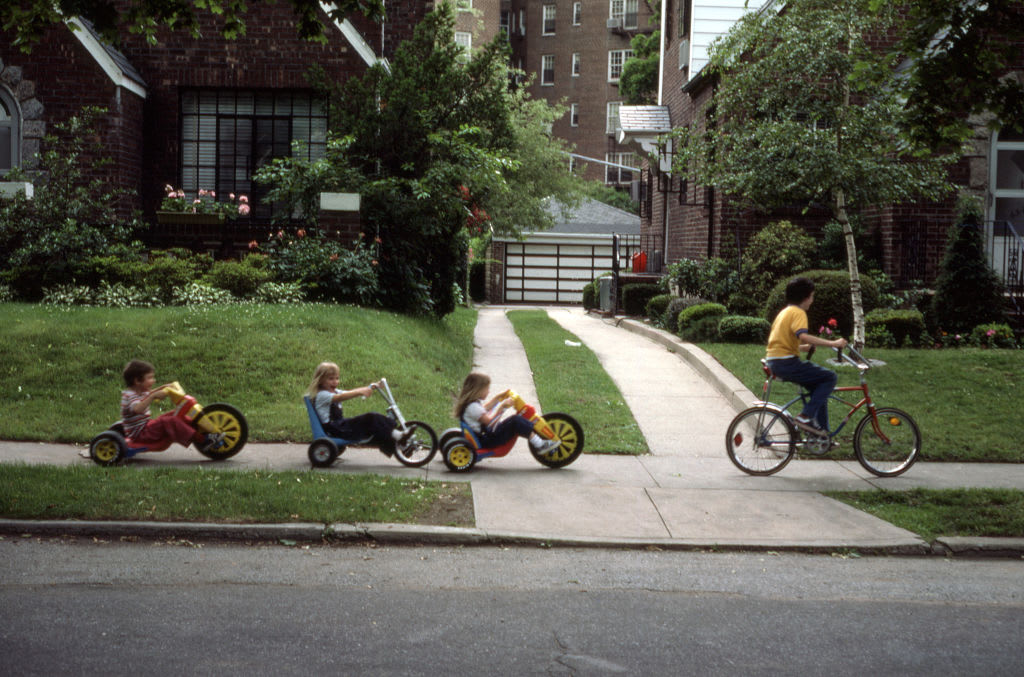Coronavirus: How U.S. hospitals are preparing for COVID-19, and what leading health officials say about the virus
Three months ago, most Americans had never heard of a coronavirus, let alone the one causing the respiratory disease COVID-19. What began as an outbreak in China has become a worldwide epidemic, with more than 100,000 cases in more than 90 countries.
There is no vaccine or specific drug to treat it. Instead, there is hygiene and quarantine.
Here in the United States, there's been panic buying of sanitizers and panic selling of stocks. Hundreds have been diagnosed with the virus, yet a lack of tests has made it impossible to determine just how many people are infected. At least 20 are dead.
At the Johns Hopkins Hospital in Baltimore, Maryland, doctors have been preparing for weeks for what they believe will be a surge of sick patients infected with the coronavirus.
When CBS News chief medical correspondent Dr. Jonathan LaPook visited the hospital this past week, Dr. Lisa Maragakis, an expert in infectious disease, was overseeing a team of 40 doctors, nurses, engineers and epidemiologists.
"I see telemedicine and information technology over there, infection control, incident command and all these things up on bulletin boards and people behind computers," LaPook said.
There's a map in the incident response center that reports in real time the number of COVID-19 cases around the world, reminding the team of the worsening crisis. This past Wednesday, the map showed 95,000 were infected. Four days later, that number climbed past 109,000.
"When you saw it spreading more rapidly than you'd like in China," LaPook said to Maragakis, "what did that mean for your efforts here?"
"It absolutely kicked us into a different gear, because that human-to-human transmission piece is the key to understanding that this is likely to spread," Maragakis said. "And so-- the level of concern increased. And we started in earnest taking our pandemic respiratory virus plans and pulling them out."
Maragakis elaborated on what those plans consist of.
"Where would we place patients who have a respiratory virus in a pandemic? How are we going to staff those areas? What measures might we-- we take to prevent those patients who are infected with the pandemic virus from transmitting it to our other patients, and also to our personnel," Maragakis said.
The first infected patients will be sent to the biocontainment unit where staff is constantly practicing how to care for others while keeping themselves safe. It's one of 10 like this in the country funded by the federal government in the wake of the 2014 Ebola crisis. The unit is equipped with rooms where exhaust fans create negative air pressure so pathogens like the coronavirus stay contained.
And downstairs in the emergency department, triage nurse Sophia Henry is now routinely screening every patient. She's on the lookout for cases of possible COVID-19. Symptoms include fever, a cough, and shortness of breath. Most cases, about 80%, are mild. But more serious cases can lead to extensive lung damage and death. Reports so far suggest that children appear to be relatively spared from severe infection.
"We know that patients are understandably concerned about this," LaPook said to Henry. "What are you seeing in terms of the doctors, nurses, and other personnel here?"
"So people are concerned. We're human. We have children at home. We have family members. Some of us are taking care of ill relatives," Henry said. "We are not martyrs. We are not here to sacrifice ourselves. We wanna be safe too. But we have to take care of the patients. This is what we do."
"And what do you think you would feel if it turned out that somebody was positive?" LaPook asked.
"I would question. 'Sophia, did you wear a mask? Did you follow the protocol? Did you do everything that you were supposed to do for yourself and for the patient?' And if my answer is 'yes' then I'm fine," Henry said.
Dr. Tom Inglesby is director of the Johns Hopkins Center for Health Security. He is an internationally recognized authority on how to prepare for an epidemic.
"I think this disease meets the definition of pandemic," Inglesby told LaPook. "We have cases on all continents."
Late last month, President Trump cited one of Dr. Inglesby's reports on global pandemic preparedness.
"The United States is now, we're rated number one," Mr. Trump said. "We're rated number one for being prepared."
"I was surprised to see that report," Inglesby said about the president citing him. "I didn't know it was coming. And it is true that the U.S. when you-- when you measure capabilities up and down in public health, health care, surveillance, the U.S. is better prepared than any other country. But it's also true that the report says that no country is really prepared for a major pandemic. And that every country has work to do."
Four months ago, to help expose weak spots in disaster preparedness, Dr. Inglesby gathered industry and government leaders from around the world for a simulation exercise. Attending were representatives who could be hard hit during a global pandemic. Industries like airlines and hotels and organizations like the World Bank and the United Nations. Officials from the Centers for Disease Control were also there, from both the U.S. and China. Remember, this was just a few weeks before the outbreak began in Wuhan, China.
The group spent an intensive day simulating how they would handle a pandemic of a new strain of coronavirus, one much deadlier than COVID-19.
The simulation utilized actors reporting on the fictional outbreak, complete with fictional travel bans, shortages of medical supplies, and economic freefall.
"I think it opened the eyes of leaders in various places," Inglesby said. "The CDC director from China was one of the participants. And he has commented since then how eerie the similarities are between the exercise and real life."
This past week, airlines canceled thousands of flights and a travel industry trade group predicted virus fears could cost more than $100 billion in lost revenue.
"The major disruptions in travel and trade that start pretty early in a pandemic, we're seeing," Inglesby said. "Beginning to see difficulties in supply chains around medical supplies, ingredients for antibiotics."
How was the simulation able to predict these situations so accurately?
"We've seen a number of problems that haven't been solved with Ebola and with 2009 H1N1 influenza," Inglesby said. "So we kind of gather up the lessons of those various outbreaks and how governments have responded. They kind of worked together and tell a story."
The biggest setback in the government's response to the coronavirus outbreak has been its inability to deliver diagnostic tests to hospitals and labs across the country, making it impossible for doctors to definitively diagnose the infection and hampering efforts to stop its spread.
"I've said from the very beginning, we need millions and millions and millions of tests out there," Dr. Anthony Fauci said. "If we have a million and a half or two million next week, great. If we don't, too bad. We should've had it. Let's try for the next week."
No one in the U.S. has more experience fighting infectious disease outbreaks than Fauci. As director of the National Institutes of Allergy and Infectious Diseases since 1984, Fauci has served as scientific adviser for every president since Ronald Reagan. He's now a prominent voice on President Trump's coronavirus task force.
"Did the shortage of testing kits allow this virus to spread more widely than it might have?" LaPook asked Fauci.
"Obviously, you would like to have had tests available to do more widespread testing," Fauci said. "But I don't think you could make a direct line to say that if we had more tests, this would've been substantially different. You can't guarantee that."
"But you may have been able to identify somebody with minimal symptoms," LaPook said. "And, 'Oh, let's isolate them. Let's figure out who their contacts are.'"
"Why don't we say it in a more, I think, realistic way. It always would've been better to have tests earlier," Fauci said.
We are now seeing "community spread" in the United States like what happened in King County in Washington state. A nursing home resident, with no clear source of infection, contracted the disease and it spread to others. Sixteen deaths have been linked to the nursing home.
"Is there any reason to think it's not gonna spread widely throughout the entire United States?" LaPook asked.
"It depends on the ability to do the kinds of public health measures that could have an impact on the degree to which it spreads," Fauci said. "The decision to do the travel restriction from China, retrospectively now, was a very wise decision, no doubt, because we would've had many, many more cases coming in, particularly from Wuhan, which would've seeded the country."
"In China, millions are quarantined," LaPook said. "Is that where we're headed here in the United States?"
"I don't imagine that the degree of the draconian nature of what the Chinese did would ever be either feasible, applicable, doable or whatever you wanna call it in the United States," Fauci said. "I don't think you could do that. But the idea of social distancing, I mean, obviously, that's something that will be seriously considered, depending upon where we are in a particular region of the country."
Social distancing is already happening in the U.S. People are staying away from each other. Tens of thousands of students are out of school. Many athletic competitions are either canceled or played without fans. Officials are urging people at high risk, like the elderly and those with serious underlying health conditions, to stay home as much as possible.
"We don't try to stop the flu through quarantine," LaPook said to Fauci. "We don't try to stop the common cold through quarantine."
"Yeah. And the reason is because you know each season with some degree of variability, that come March and April, it's gonna go down," Fauci said.
There's no guarantee, Dr. Fauci told 60 Minutes, that the coronavirus will die down in warmer weather. Also, we have a vaccine and medicines for the flu. Right now, for the coronavirus, there are no proven treatments.
Dr. Fauci's lab at the National Institutes of Health has created a prototype for a vaccine, but he estimates it will be at least a year before it is approved for widespread use.
After a week of mixed messages, government officials promised there will soon be at least a million more tests available, but today there are nowhere near enough.
"Early on, the administration was criticized for downplaying the outbreak," LaPook said to Fauci. "What's the danger of minimizing the risk of an infectious disease outbreak?"
"Well, I mean, the danger of minimization on-- on-- in any arena of-- of infectious disease and outbreak is that you might get people to be complacent, number one," Fauci said. "Number two-- when bad things happen, your credibility is lost because you've downplayed something."
"I think a lotta people are very interested in the relationship between the scientists and the administration," LaPook said. "And specifically if President Trump says something-- at the beginning of February like, 'We think we have it under control.' You're in the room. Were you able to talk to--"
"I pushed back, of course," Fauci said.
"Some people have been worried that you've been muzzled," LaPook said.
"I'm not muzzled because I'm talking to you," Fauci said.
This past week, Dr. Tom Inglesby told Congress, and 60 Minutes, one of the duties of public officials is to be candid.
"It's a natural instinct of a health official or a government official to wanna reassure people," LaPook said to Inglesby.
"Public health agencies aren't departments of reassurance, they're departments of public health," Inglesby said. "They need to tell people what kind of interventions will be most useful for their families, for their-- for their communities, what individuals can do to try and decrease their own risks."
"The very act of being honest and putting it in perspective is reassuring," LaPook said. "Even if the information itself is worrisome."
"Yes. Yes. It's true," Inglesby said. "I think there are gonna be challenges. And there are-- are gonna be a lotta sick people. But I think we've got a very, very strong health care system and a lot of talent in our public health agencies, an incredible scientific base in this country. And very, very-- strong industry in the right places. So I think we're-- we're gonna get through it. I think it's just gonna pose a lotta challenges along the way."
Produced by Denise Schrier Cetta and Howard L. Rosenberg. Associate producers, Katie Brennan, Julie Holstein and Jennifer Dozor. Broadcast associate, Sheena Samu. Edited by Craig Crawford and Patrick Lee.

